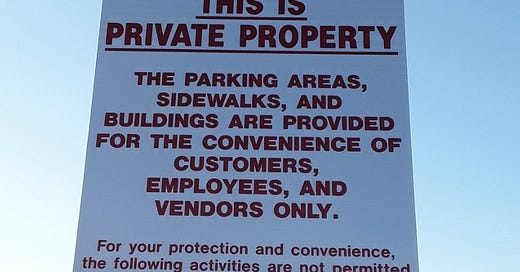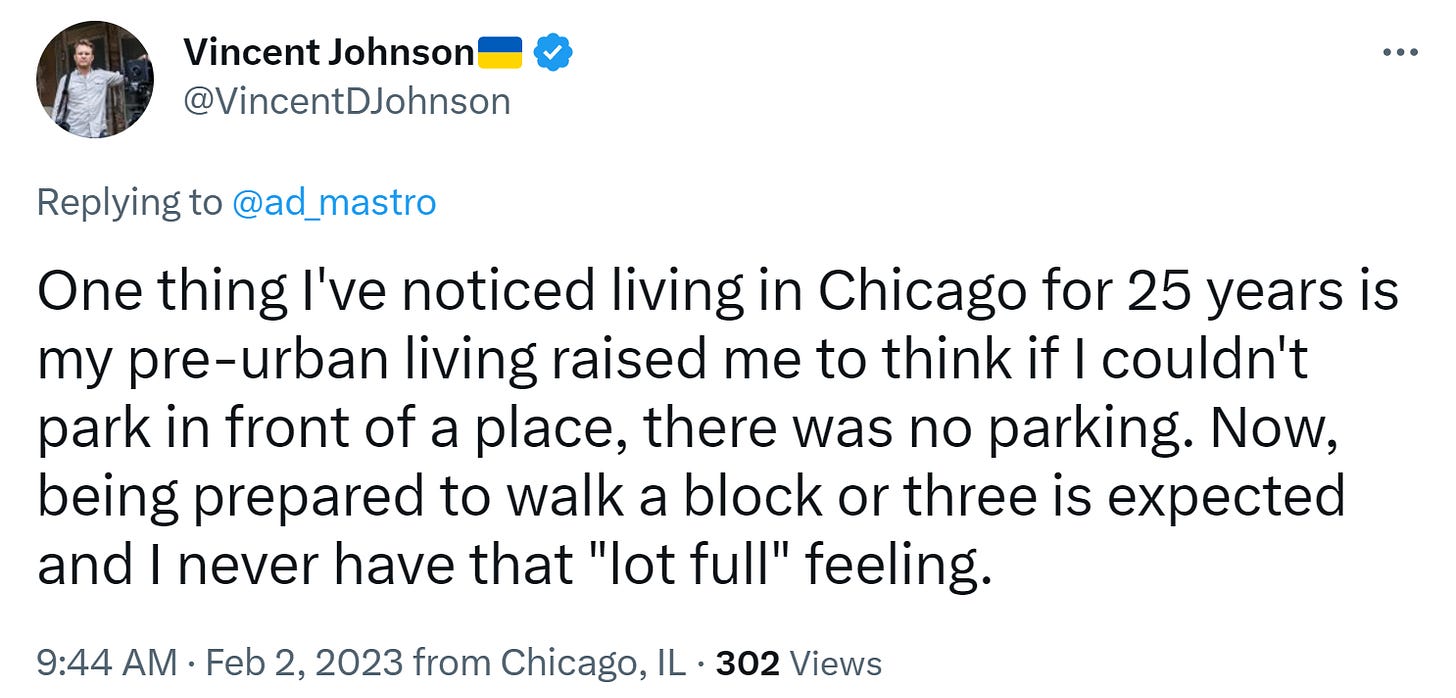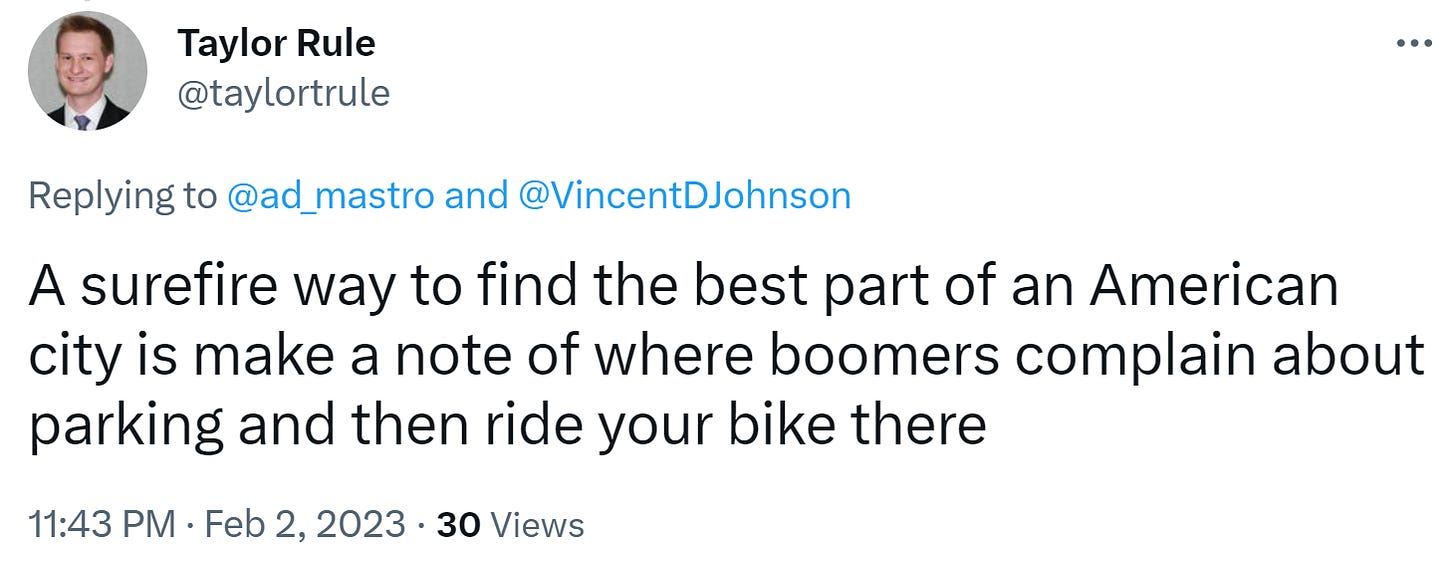Your (and More) Thoughts on Parking Anxiety
We have to relearn, almost intellectually, what cities are
I wrote a couple of weeks ago about parking, and why the prospect of waiting for a parking spot, or finding one a little further away, strikes such intense fear into the hearts of suburbanites (including, sometimes, myself):
When I’m at a store or restaurant and the lot is (or looks) full, I almost immediately get this panicked feeling. What if I can’t find a spot at all? Of course, it might take, at most, five minutes before a spot opens up. Yet that feeling of being stuck in your car with nowhere to put it is almost intolerable, at a level below consciousness.
It feels as though someone is unjustly taking something away from you. It kind of reminds me of that snarky saying, “Lack of planning on your part does not constitute an emergency on my part.” But it does, because I need it. The kind of anger a situation like this can spark is unreasonable, but entirely genuine.
Sometimes, when a parking lot is full, I find myself muttering something like “What’s going on here?” As if there’s something unusual or even vaguely suspicious about a parking lot being full. It reminds of something I saw someone point out on Twitter once. Cyclists love seeing other cyclists, but motorists hate seeing other motorists.
I got some interesting comments on this that I’d like to share and dig into a bit. Here are a few Twitter reactions:
And:
And:
A comment:
That anxiety will “melt away” when society at large is presented with alternative options (such as walkable/bikeable streets)...it’s the lack of other reasonable and safe options that has humanity backed into a “fight or flight” corner...squabbling over the crumbs of asphalt that make your day either “easy” or, a congested hellscape...Oh, and, ”good luck”!
Another:
Often the problem is not lack of parking, but a need to park “closer.” Which makes your car more likely to get nicked or scraped as well. (Or maybe the senses of urgency and panic are actually misidentified and are, in fact, sublimated desire for liberation from the car and frustration that we cannot find a way to do it?)
Another:
People have known for decades, since before the introduction of cross-country and urban-ripping expressways, that everyone having a personal car simply wasn't going to work in modern society unless an insane amount of space was dedicated just to car storage and driving right-of-way. It would require destroying both natural land and developed neighborhoods.
And one more:
I’ve never experienced this panicked feeling in a parking lot, for exactly the reason you mention - it just takes a few minutes for a spot to open up. Parking lots may be ugly eyesores, but they never fail to do the job of providing parking. (To a fault, as you know, since they're usually mostly empty.)
I *do* experience that panicked feeling in urban street-parking scenarios, because the prospect that you might have to circle streets for 45 minutes in search of a legal spot is a real one. Adding to the anxiety is that if you miss a spot opening up by a split-second, some other guy will grab it and you’re in for another indeterminately long period of circling. “Reality impinging on possibility” as you put it is a good way to express what makes this so aggravating.
These are all great—when the comments are as good as the articles (I hope the articles are this good) that’s really gratifying. Thank you, if anyone reading this is one of those commenters!
That last bit, about genuinely being stuck in a city with nowhere to park, is familiar to me too, and is probably the original source of this anxiety: having experienced that feeling once or twice, every possible parking shortage feels like it could turn into that.
To this day, I still feel something like that when I drive past a city. I think of passing Philadelphia on I-95, which is the largest city I frequently drive past (D.C. too, of course, but you can see Philly really well from the Interstate.) I get this slight feeling of menace, like these are off-limits places. Like they’re not for me.
The actual source of that feeling is not crime, which it might be for some folks—it’s basically parking! The thing is, cities are for people; they’re just not for cars. They’re not for pulling up right in front of each business I want to patronize. That does mean that it’s a lot of logistical trouble to go to the city for just one thing. It closes it off—to motorists—as a place to casually pop into at leisure. Which diminishes its importance in our minds.
And so the special (and very expensive) convenience of a shopping center with a bountiful parking lot becomes not only an expectation, but also a sort of ideology.
That expectation of driving everywhere and parking easily basically strikes—almost at a metaphysical level—at the heart of what cities actually are. I wonder how much of the anti-urban sentiment in America comes down to some form of this. I wonder to what extent we have to relearn, almost intellectually, what cities are, because the suburban experiment—the suburban revolution—has so effectively wiped away that memory in just a few generations.
Related Reading:
Fifty Million Private Realms Might Be Wrong
Thank you for reading! Please consider upgrading to a paid subscription to help support this newsletter. You’ll get a weekly subscribers-only post, plus full access to the archive: over 500 posts and growing. And you’ll help ensure more material like this!







The solution is pretty easy, even in the most dense cities, it consists of a combination of
1) dynamic pricing at the convenient parking lots/structures, e.g. lower Manhattan during business hours. This will be cheap at the times when the parking lot is underutilized, and pretty expensive when it is 95% full
2) abundant park and ride lots at the end of subway and bus lines
This delivers both convenience (for a price) and free parking (plus the time and money for a bus fare), depending no personal preferences. Today's GoogleMaps can drop a pin on where you parked, remind you what bus you need to get back there, even tell you the exact minute when the bus will come. This is also added convenience, and it doesn't even cost anything (other than a smart phone, which 90% of the population and 100% of the drivers already have).
Go to Europe: there are lots of underground parking garages in every major city. The spaces are tight, parking in one of them is a skill you have to work on, but it's there. We have a lot of trouble building infrastructure in the US. If we tried to build similar garages here, we'd have: Greenies opposing it because it encourages driving; NIMBYS opposing it because it's in their neighborhood; and Righties opposing it because it requires taxpayer money.